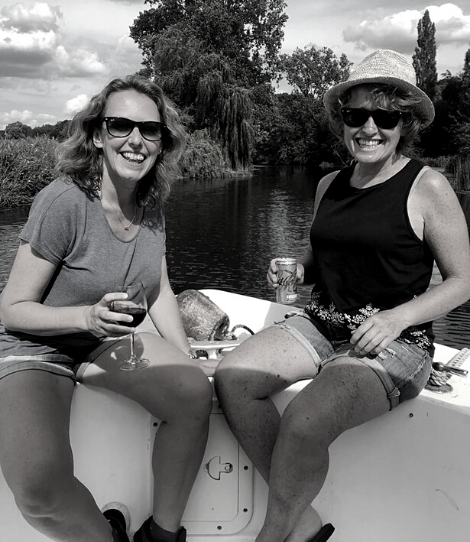I’ve always paid attention to Alzheimer’s research in the news, from the day my once rapier-sharp mum Ella Muir first went for a dementia test with her lovely GP in Glasgow. Smart as ever, Ella wore a jacket from the Jaeger sale, little heels, and carried her good leather handbag for the appointment. Until a few years before, she’d volunteered in her retirement at the Citizen’s Advice Bureau. Dignity mattered.
We didn’t really discuss what was happening as we walked to the surgery; my mum felt sure her GP would sort it out – she’d been brilliant when my dad fought through a series of strokes before he died. The interview was torture: humiliation for my mother, and agony for me sitting listening, as the doctor gently asked: “Who is the prime minister?”, “What’s your date of birth?” and “What was the name of your school?”. Ella knew the prime minister (and had quite a low opinion of him), but she was vague and tried to cover up on the school front. The season might have been autumn or spring; she wasn’t entirely sure. She faltered remembering a short shopping list. What were my mother’s feelings? She didn’t answer that question either.
Daughters of Alzheimer’s
As so many of you will know, Alzheimer’s and dementia have tentacles which entrap not only the patient, but family and friends around them. It’s a shared plunge into bleak emptiness. I’ve just produced a second documentary, Sex, Mind and the Menopause with Davina McCall for Channel 4. During the project, her own father died of Alzheimer’s, and she soldiered on with filming. A complete trooper. But as Davina says on camera: “It’s horrific”.
We are both daughters of Alzheimer’s, and that’s why we started investigating the changes to the mind during menopause in our second film together. My own mum died in 2015, after a long decline through falls, alcohol and hospitals, which ended gently in a nursing home. There is no hope, there is no solution, I thought then. Billions were being spent on research, with negligible results. Two thirds of Alzheimer’s patients are women, so what makes us so special, so unlucky?
The more hot flushes we suffer, the more our cognitive decline.
Then a surprising answer came, a few years after Ella’s death, as a by-product of the book Everything You Need to Know About the Menopause (but were too afraid to ask) which I had started researching. I discovered a growing body of academic work on how important hormones are to midlife female brain function. The moment when our brains start to change in our 40s and early 50s in perimenopause and menopause is key to later life.
Increasingly experts like Professor Philip Sarrel at Yale University say that hot flushes are “the canary in the coal mine”, a warning sign of brain damage to come as we age. The more hot flushes we suffer, the more our cognitive decline. And it turns out that the safer body-identical hormone replacement therapy is a no-brainer for those who want to protect their brainpower. A huge study of women’s insurance records in the USA, which we’ll discuss in more detail later, is pointing – thrillingly – towards the protective powers of HRT in keeping the brain healthy.
Why we need more than ‘bikini medicine’
Starting my investigation, I got on WhatsApp with Dr Lisa Mosconi of the Weill Cornell Women’s Brain Initiative and author of The XX Brain: The Groundbreaking Science Empowering Women to Prevent Dementia and she told me: “Until now, medical research has focused on ‘bikini medicine,’ assuming that women are essentially men with breasts and tubes. We need to recognise that women’s brains age distinctly from men’s, due mostly to the decline of a key brain-protective hormone: estrogen.”
I went on Mosconi’s website and saw two PET scans of a pre-menopausal and post-menopausal brain in a normal woman, not one with dementia. The post-menopausal brain had far less activity; the lights were clearly dimmer.
Mosconi explained: “The brighter the colour on the brain scan, the more the activity, and the postmenopausal woman’s brain is darker and the activity is thirty per cent less.” Thirty per cent? Could that be true? Mosconi said that might not happen to every woman at the same level – some just lose 20 per cent of activity, some less – but this postmenopausal brain on the scan was still “cognitively normal”. After menopause, we are deprived of estrogen, and not always firing on all cylinders, and estrogen regulates the transport of glucose, which is fuel for the brain. In later work, Mosconi showed that grey matter – our thought processor – makes a comeback post menopause, and we pump more blood to the brain, but white matter – our connections – flatlines. (Read the full paper here in Nature.)
Did I have dementia due to menopause?
Well, I could identify with those failing connections and memory problems. As I’ve written before in Noon, I had a car crash of a menopause, eventually leaving my home, marriage and job. I forced myself through sleeplessness, heart palpitations, night sweats and pre-dawn anxiety attacks without HRT, but what finally sent me running to a private menopause clinic – after I got no help from my GP – was the terror of memory loss.
I was working as a film critic at The Times, remembering 350 movies a year and the names of directors and even supporting actors, but one day as I was writing a shopping list, I thought: “I must shave my legs,” and wrote down the word “shaver” on the notebook. I knew there was a better word, but I couldn’t find it. About half an hour later, I realised it was “razor”. The white matter had short circuited in my brain.
That’s bad enough for anyone, and it was clearly a different kind of memory loss from forgetting a cinematographer’s name. I had lost an everyday noun, and I had watched Ella’s vocabulary shrinking over the years, as nouns dropped away. Like Davina in perimenopause, when she couldn’t read the autocue or remember celebrities’ names, I thought I had early onset dementia.
Finally, a solution!
Then the miracle happened. I got body-identical HRT – estrogen, progesterone and testosterone, which is, incidentally, a key female hormone. Within days my sweats and anxiety had gone, and within a week my memory pinged back. When the testosterone really kicked in a number of weeks later, I felt sharp, confident and energetic – and my libido also enjoyed a new relationship.
As both a patient, living the experience, and an investigative journalist gobbling up science papers, I searched for the connections between lack of estrogen and dementia. One aspect stood out in medical records: Women who had hysterectomies at an early age were more likely to get dementia. Those who had their ovaries removed too in surgical menopause or had Premature Ovarian Insufficiency doubled their chance of getting dementia – unless they took HRT. That was chilling.
I also talked, in lockdown, to neuroscientists and endocrinologists around the world, and ended up one night discussing with an academic in Wisconsin how mice who got their ovaries removed would get lost for much longer in a maze. But there were only small studies on the benefits of HRT, and one study which said HRT actually increased the risk of dementia: the famous Women’s Health Initiative study in 2002, which also left women terrified of getting breast cancer. That study has now been much discredited, as the average age of the menopausal woman was 63, and some were as old as 79, suddenly being given large doses of HRT. Worse still, that WHI HRT was made from estrogen from pregnant mare’s urine and a nasty progestin called medroxyprogesterone acetate, which has an increasingly bad reputation in medical circles.
HRT, dementia and Alzheimer’s
No one, it seemed, had properly studied the new, body-identical HRT and its effect on dementia. The precription I use – estrogen gel and testosterone cream through the skin, with a micronised progesterone pill at night – is made from yams and has the safest profile of any HRT, with no breast cancer risk over a five-year study. It’s also not a risk for blood clots.
But in May 2021, I actually jumped for joy and immediately called two friends whose mothers have Alzheimer’s disease, as big news broke of neuroscientist Dr Roberta Diaz Brinton’s latest research at Arizona University. She had studied the health insurance records of almost 400,000 women and discovered that those who had used or were using HRT were 58 per cent less likely to develop Alzheimer’s and other neurodegenerative diseases. (Here’s the paper: https://pubmed.ncbi.nlm.nih.gov/34027024/)
In fact, those who stayed on HRT longest had the best outcomes: Women who took it for six years or more were 79% less likely to develop Alzheimer’s and 77% less likely to develop other neurodegenerative diseases like Parkinson’s, dementia and multiple sclerosis – a hugely encouraging effect. My grandmother Isabella died of multiple sclerosis. This was for her too.
Preventing Alzheimer’s and dementia with HRT
Announcing the study, Brinton explained: “The key is that hormone therapy is not a treatment, but it’s keeping the brain and this whole system functioning, leading to prevention. It’s not reversing disease; it’s preventing disease by keeping the brain healthy.”
It all makes sense, particularly when added to Mosconi’s and Brinton’s other research which showed the Amyloid plaques which signpost Alzheimer’s starting to build up after menopause, particularly in women with the APOE4 gene which increases chances of the disease. Keeping your brain healthy with estrogen is a bit like keeping your teeth healthy by brushing off the plaque to stop decay.
Mosconi also provides hope for women and men who cannot take HRT – regular exercise seems to reduce dementia by 30%, and eating a Mediterranean diet with plenty of vegetables and oily fish also reduces risk.
So why has it taken so long for this research on women and Alzheimer’s to be done? The fatberg of gender bias in the medical establishment doesn’t help, but also the way academics sit in their separate silos – neuroscientists who have no idea about menopausal brain changes or the latest body-identical HRT and its low risk. If you look at the Alzheimer’s Society and Alzheimer’s Research websites, their information on this is completely out of date. The Menopause Charity does, however, have an article on the new research. The big pharmaceutical companies are not interested – hormones are ‘products of nature’ and not patentable for big profits.
Women at risk of Alzheimer’s and dementia
Unless something changes, one in five women will die of Alzheimer’s or dementia. It’s the UK’s biggest killer. We need to ask for more research on body-identical HRT and dementia, and shout out about what we know so far. It’s all we’ve got in this battle.
As the poet Lavina Greenlaw writes of her father’s dementia in The Built Moment:
“The act of forgetting used to take time.
Now it accompanies him through each day
And the world folds itself up behind his every step.”
The world started folding up behind Ella’s every step, and there was nothing I could do about it, except get it officially diagnosed. But my and my daughter’s generation will be fighting for change.
Kate Muir
health
View All
‘Menopause happens to half the population, so why do I feel so at sea?’
What are perimenopause and menopause really like for women, and how can we make them better?

Why we’re all talking about menopause
Menopause has gone from a topic talked about in hushed tones to a full-on campaign

Hormone Hell: two perimenopausal ladies on a canal boat…
In this extract from Rosie Wilby’s ‘The Breakup Monologues,’ an enjoyable trip goes awry…


